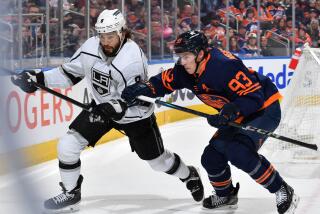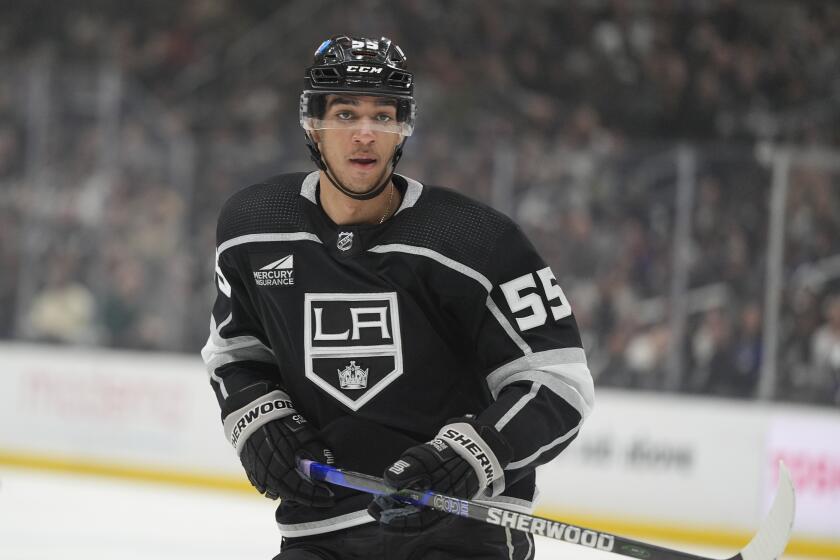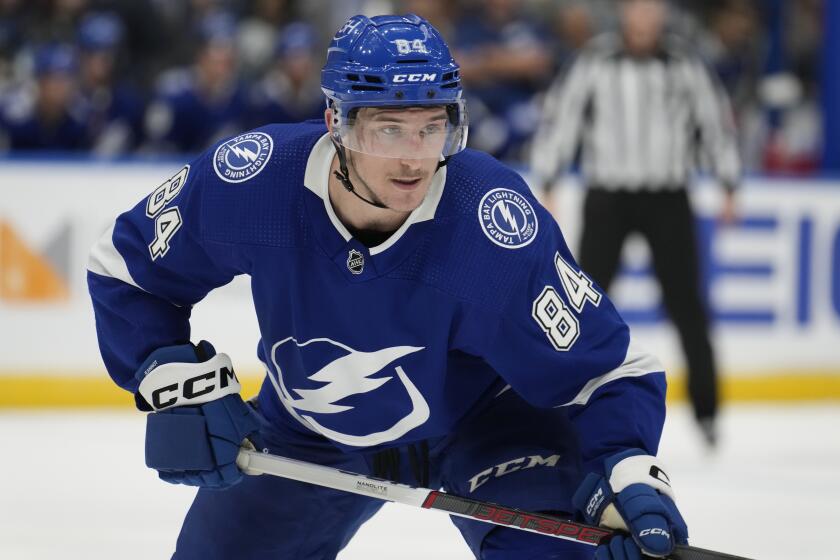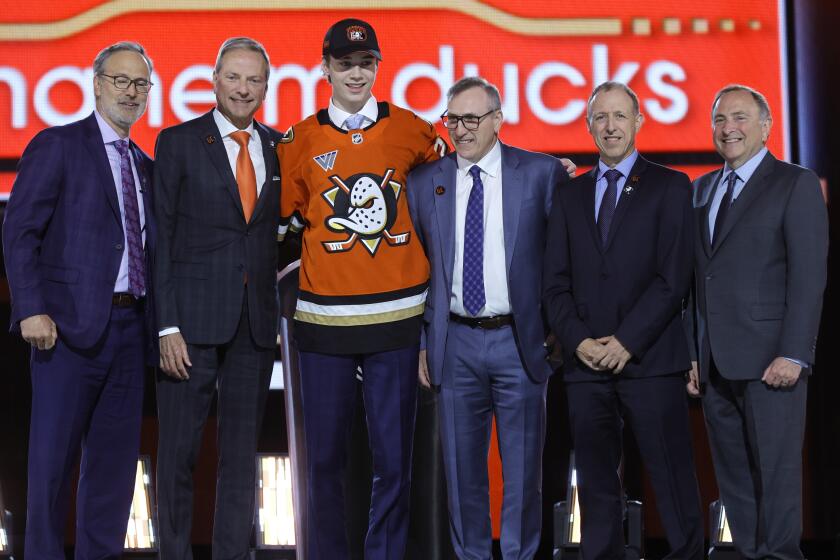Brotherly Love Embraces Lindros : Hockey: Philadelphia Flyers star is emerging as the player everyone expected and more, . . . “ the prototypical player of the ‘90s . . . a franchise player.”
It was as if I had gone back to school for a history lesson. As I walked through the streets of Philadelphia, I was caught up in the tradition.
The Liberty Bell.
Independence Hall and the Declaration of Independence.
Betsy Ross’ home and the first American flag.
The center of the city is basically the same today as it was when William Penn founded it in the late 17th century. Travel with a resident of Philadelphia, and he proudly will point out each landmark in detail, from the crack in the Liberty Bell to a small park in the downtown area where a Revolutionary War battle was fought and the bodies of the dead are buried.
At each stop, I see history come alive. I also see something new sprinkled in with the old. I knew the number 1776 was synonymous with this history. But so is 88.
In a society where youngsters like to wear jerseys with the numbers of their favorite players, there are no Phillies jerseys to be found, even as the youngsters play ball at the park. No Eagles jerseys, even with the excitement that new Coach Ray Rhodes brings the team. No 76ers jerseys. But there is a No. 88 emblazoned on the back of a Flyers jersey at each historic stop.
It’s kind of strange when you think about it because the Flyers haven’t won a Stanley Cup since 1975 and haven’t even made the playoffs the past five years. But tradition is alive and well because of the excitement Eric Lindros, No. 88, has brought to Philadelphia.
This is a city waiting to embrace a champion the way it did Mike Schmidt and Pete Rose, Chuck Bednarik and Buddy Ryan, Wilt Chamberlain and Dr. J, and Bobby Clarke and Fred Shero.
“You don’t want to put too much pressure on a 22-year-old kid, but I can feel the people of this city pulling for Eric Lindros the same way they did the old Broad Street Bullies,” says Clarke, the president and general manager of the Flyers.
Lindros already is part of history in Quebec City, albeit a negative one. He was selected first overall by the Nordiques in the 1991 draft but denounced the team and the city, refusing to play there. One year later, the Flyers won a heated dispute with the New York Rangers, giving up No. 1 goalie Ron Hextall, defensemen Steve Duchesne and Kerry Huffman, centers Mike Ricci and Peter Forsberg, left wing Chris Simon, first-round draft choices in 1993 and ’94 and $15 million. Now Lindros is trying to add to the history of Philadelphia’s sports teams.
It’s clear that big things happen around Lindros. When he came to Philadelphia, experts said a Stanley Cup was sure to follow. After two injury-filled seasons, Lindros is healthy--and so are the Flyers. They clinched a playoff berth, won the Atlantic Division title and are one of a handful of teams in the NHL that could win the Cup.
“Eric Lindros is emerging as the player everyone expected and more,” Rangers center Mark Messier says. “He’s the prototypical player of the ‘90s. . . . He’s a franchise player you can take and build a team around. There’s going to be a time when a player like that will win the Stanley Cup. It could be this year.”
For years you’ve heard about his size, his power, his skills. Despite missing 23 and 14 games with knee injuries the past two seasons, Lindros still delivered two 40-goal seasons and singlehandedly hauled the Flyers to the edge of the playoffs.
This season, Lindros is the team’s captain. He is no longer the young guy breaking into the NHL. This is his team.
On this night, the Lightning have taken a 2-0 lead. But then Tampa Bay defenseman Enrico Ciccone makes a mistake when he plants an elbow into the side of Lindros’ head in a collision behind the net. The next time Lindros steps on the ice, there is a menacing glare on his face. Lindros combines with John LeClair to set up linemate Mikael Renberg for a goal.
On his next shift, Lindros endures a big hit along the right-wing boards, digs the puck loose and starts a play that results in a goal by defenseman Kevin Haller. The Flyers go on to beat the Lightning, 5-4.
“This is definitely Eric Lindros’ team,” Flyers Coach Terry Murray says. “The team takes on his personality. Everybody watches him and takes his lead.”
Center Craig MacTavish played in Edmonton with Wayne Gretzky and Mark Messier and sees a lot of the same unique qualities in Lindros that distinguished Gretzky and Messier.
“Anybody who gets out there with Eric will get a scoring chance--guaranteed,” MacTavish says. “When I was in Edmonton, nobody ever went through a slump because Glen Sather would throw them out with Wayne, and he would tee them up for an empty-netter, or two or three great scoring chances. The same is true with Eric.
“And Eric’s leadership abilities are a lot like Mark’s. The only difference is Mark’s at the stage of his career where he’s gone through all the experiences that come with six Stanley Cups. Nothing teaches you more than playoff hockey, and once Eric gets those same experiences, he will be the same kind of leader and the Stanley Cups will follow.”
Lightning Coach Terry Crisp is animated after the game when he is asked about trying to stop Lindros.
“Trying to stop Eric Lindros is like trying to stop Shaq,” Crisp says, arms flailing in frustration. “And trying to stop that line--with Lindros, Renberg and LeClair--is like facing an NBA team.”
Lindros is next in the NHL’s evolution after Gretzky and Mario Lemieux. The difference between Lindros and them, however, is that they had to score or set up others to be what they are. At 6 feet 4, 237 pounds, Lindros can make his presence felt without getting a point.
“My test is every year, every game, every shift,” Lindros says. “People want me to be the next Wayne Gretzky or Mark Messier or Mario Lemieux, but that’s not me. I’m here to be the best Eric Lindros can be.
“I haven’t changed; I hop in my pickup truck and go home after games and practices. And I still room with my brother when I go home to Toronto in the offseason.”
When the Flyers got off to a 3-7-1 start this season, some fans questioned whether Lindros was worth all the fuss. They said he got fat during the lockout. Lindros bristles at the suggestion.
“I can’t believe it. I go through a little slump and people get worried. I wasn’t worried, I don’t know why anybody else should be worried. I wasn’t as ready as I might have been because I thought the season was history. Then, before I had a chance to work into shape, I got sick and actually lost more weight than I needed. Still, I started out only a couple of pounds over my playing weight. I wasn’t a blimp like some people would have you believe.
“Look, I can’t be bothered by some people who might think I’m not going to be what they expected. You’ve got to remember where I’m coming from. This isn’t the end of the world to me, that some fans were nervous. Remember, I’ve seen the end of the world, and it ain’t pretty.”
Lindros was referring to the education he received when he refused to report to the Nordiques when he was just 18 and was public enemy No. 1 in the province of Quebec.
Every step he takes is scrutinized, especially the missteps.
“I go to a bar with friends, and the next thing I know I’m accused of spitting at a girl and being a hard-ass,” he says, referring to a 1992 incident outside of Toronto. “It winds up in court, and I’m the bad guy.”
Because of that negative press, he is hesitant to flow with superlatives when an answer could make him look egotistical, vain or not team-oriented.
For example, being captain is a big deal, but Lindros says it isn’t. “It’s just a letter,” he says. “Being captain comes naturally in a way, because it’s pretty much showing the desire to win, doing what you can to get the other guys going. No big deal.”
Also, Lindros admits he admires Messier a lot and carried Messier’s trading card in his wallet for years. But when he is asked about comparisons to Messier, Gretzky or Lemieux, he clams up, saying, “I just go out and play. Why make things more complicated than they are?”
Questioned again about the comparisons, Lindros says, “You’re looking at this too deeply. I’m not a complicated guy. Why swim 5,000 feet below sea level when you can swim 100 feet under and you can pop up for a breath of air instead of going down deeper and getting in over your head.”
It’s a perspective that’s beyond Lindros’ 22 years and shows the intelligence that has made him so good on the ice.
Finally, Lindros opens up on the superlatives that have been thrown his way. “I know it took Wayne Gretzky five years to lead the Edmonton Oilers to the Stanley Cup and it took Mario Lemieux seven years to do it,” Lindros says. “But I can’t worry if people don’t think I’m Wayne Gretzky or Mario Lemieux. Personal accolades come from team play. That’s the bottom line.”
One thing Lindros has learned is that he doesn’t have to do it all himself. He doesn’t have to make a hit every time he’s on the ice.
“The acquisition of John LeClair saved my career,” he says. “My body can’t go through the abuse I was doing the first year or two. You can’t just charge into the opponent’s zone like a bull in a china shop, trying to cause havoc. You can’t do that for 15 years. Gordie Howe told me not too long ago that it’s great to go out and play physical, but you have to pick your spots.
“With two big wingers like John and Mikael, I think I have the best job in hockey right now. Two guys to look for who can’t miss, and all I have to do is find one. I’ve got two big wingers with speed, so I don’t have to be as physical, I don’t have to go running around the ice with my head cut off like in previous years.”
Confident without being cocky. That’s Eric Lindros.
“Eric is having success through team play,” Clarke says. “But he can do a lot more on his own than anybody who has ever played this game because of his size, skill and toughness.
“He reminds me a lot of Phil Esposito, but he skates better than Phil and he’s so much bigger than anyone who has ever played at such a high level.”
Lindros has already led the Flyers to heights this season no one expected, a playoff berth for the first time since 1989 and a division title for the first time since ’87. And he has a chance to lead the NHL in scoring, something no Flyer has ever done.
“We knew this guy was going to be the best player in the NHL,” says Pierre Page, who was the general manager of the Nordiques when they chose Lindros in 1991. “He had skill, toughness--everything in one package.”
Subtract the time lost to injury and Lindros matches up against anybody in their first two major league seasons. After 125 games, Lindros had 85 goals and 87 assists. At that same point in their careers, Lemieux had 71 goals and 120 assists and Gretzky had 72 goals and 107 assists.
“Eighty-eight is pretty tough to defend,” Rangers Coach Colin Campbell says. “I look around the league, and I don’t see any team coming up with answers on how to stop him.”
Says Rangers defenseman Brian Leetch, “He’s raised his game another level, and he’s always been one of the top players in the league. It would be hard to put anybody above him.”
Lindros, Pittsburgh’s Jaromir Jagr, Detroit’s Paul Coffey, Quebec’s Wendel Clark and St. Louis’ Brett Hull are the leading candidates for MVP.
“I hear people talking about how Mike Keenan has gotten Brett Hull to take his game to a different level, how Paul Coffey is adapting to Scotty Bowman’s system in Detroit and I watch Jaromir Jagr dominate in one-on-one play, but Eric did those things when he came into this league at 19,” Clarke says.
“There is nobody more powerful in this league,” Canadiens Coach Jacques Demers says. “I think we’re just beginning to see what he’s going to be. He’s 22, and he’s already the most dominant player in the game.”
Two years ago, as coach of the Capitals, Murray faced the same challenge of stopping Lindros. He didn’t realize then just how good Lindros was or could be. He knows now. “I would leave him out there the whole game if I could,” says Murray, in his first season as Flyers coach. “What I like about him most is throughout his career, Eric has been the best at every level. What makes the great players great is that they don’t accept anybody else’s standards, they just keep on striving to be the best. That fits Eric to a T.”
Lindros smiles at hearing all of the plaudits, then he shrugs and talks some more about team goals, which leads us to ask if he is ready to make that next step of winning in the playoffs that made Gretzky, Messier and Lemieux so great.
“I’ve been ready,” he says, “it’s just that I haven’t had a chance to show everyone.”
More to Read
Go beyond the scoreboard
Get the latest on L.A.'s teams in the daily Sports Report newsletter.
You may occasionally receive promotional content from the Los Angeles Times.




